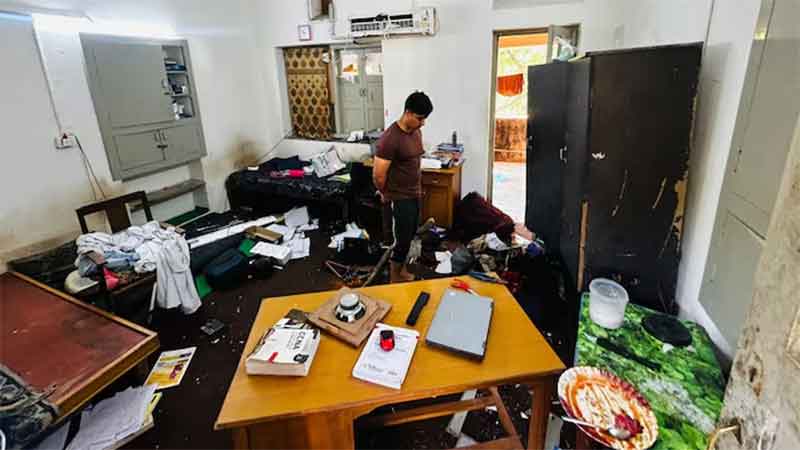
The primary focus of scholars studying Islamophobia is on communities and individuals that represent Islamophobia attitudes and behaviours. Xenophobia, otherization, social discrimination, and racialization are all extensions of Islamophobia. It is more than just the mistreatment of Muslims that frequently asserts with institutionally and structurally entrenched premise, leading to the complex social marginalisation of Muslims in Western cultures. It is also more than just a policy or system that leads to a bad image of Islam, Muslims, and Islamic governance. It is not a brand-new occurrence, nor does it exclusively impact Muslims. The rise of social media, global networks, and immediate communication industries has increased the influence of xenophobic content. In reality, comprehending Islamophobia necessitates a broad, interdisciplinary approach. Over the past twenty years, there has been a noticeable rise in Islamophobia incidents directed towards Muslims in countries where Muslims do not hold the majority population. Discriminatory laws, administrative policies, judicial decisions, and public actions by state authorities and private citizens that target Muslims are examples of these attacks. Understanding the causes, driving forces, and underlying power structures that give rise to and sustain international Islamophobia are necessary to respond to this issue.
The Dilemma of Islamophobia Definition
Eight institutions run the risk of restricting free expression related to Islam by embracing a contentious interpretation of the term Islamophobia. Only 21 of the 166 institutions in the UK use the definition of Islamophobia that the All Party Parliamentary Group (APPG) developed based on data from British Muslims. According to this definition, Islamophobia is a form of racism that targets Muslim identities or expressions. Amidst allegations that the definition would restrict free expression and violate equality laws, the government rejected it in 2019. The universities of Edinburgh, Nottingham, Loughborough and Imperial College London are among the institutions that employ the APPG definition. Different definitions of Islamophobia are used by Bournemouth University and Suffolk University, both of which prohibit criticizing Islam or Islamic customs and practices.
Free speech advocates have continuously cautioned that this definition, which conflates reasonable criticism of religion with hatred directed at specific Muslims, endangers attempts to combat anti-Muslim prejudice as well as academic freedom and freedom of speech. The APPG cites instances of Islamophobia, such as assertions that Muslims are enforcing their religion via force or that they are enslaving minority communities. However, academics concur that armed conquest had a role in the historical development of Islam. Moreover, even under contemporary Islamic theocracies, minorities who are not Muslims are usually subject to them. Nonetheless, these images and symbols have been linked by the APPG to traditional Islamophobia.
Critiquing the Definition
Islamophobia can include criticism of Islamism, an extreme political philosophy founded on Islam, according to the APPG study that defines the term. The APPG definition has been forced into institutions by organizations like Muslim Engagement and Development (MEND) and the Muslim Council of Britain (MCB). Since 2009, the government has maintained a policy of non-engagement with the MCB because of worries about the organization’s ties to extremism. The embargo was put in place following the signing of the Istanbul declaration by the deputy secretary-general of the MCB, which called for assaults on Royal Navy ships enforcing a UN weapons embargo on Gaza, which Hamas controls. Several MEND volunteers and staff members, including senior leadership members, have also been charged with having ties to extremism.
These include downplaying incidents of terrorism, encouraging anti-Semitic treacheries, and legitimizing the British troops’ slaughtering in Iraq. Universities are required by law to support staff members’ academic freedom and freedom of speech. A human rights curriculum at the University of Bristol was cancelled in 2020 when Prof. Steven Greer, the instructor, was wrongly accused of Islamophobia. The Charlie Hebdo shootings and the Islamic death punishment for “blasphemy” were topics covered in the module. Prominent Muslims are among those who oppose the APPG’s definition of Islamophobia. As the Muslim Member of Parliament with the longest tenure, Khalid Mahmood MP has described the APPG definition as “effectively an Islamist charter for cutting off criticism of Islamism.” The APPG’s narrow understanding of ‘Muslimness’ has drawn criticism from Sara Khan, the government’s independent advisor on social cohesion, who says it leaves behind those Muslims who choose to live their lives or practise their religion as per their free will because they do not have Muslimness that other Muslims find acceptable.
Consequences of Islamophobia Definition
The ubiquity of this concept of Islamophobia in UK universities shows that organizations that ought to be leading the charge to protect free speech have a worrisome disregard for it. Using this nebulous term runs the risk of identifying as offensive or hostile to any critical conversation or debate surrounding Islam. The idea that discussing issues pertaining to Islam is the same as practising Islamophobia restricts free speech and inhibits open inquiry, both of which are essential to a university’s mission and goals. Efforts to combat anti-Muslim prejudice may also be hampered by the animosity this causes. Universities should urgently re-evaluate embracing this definition while considering their legal obligation to protect academic freedom and free expression.
Way Forward
Islamophobia was not acknowledged in the UK as a distinct and particularistic phenomenon. The APPG orientation has not adequately addressed significant events and changes throughout the successive UK administrations in office. At this point, the APPG’s worth and authenticity must be seriously questioned. The fear is that Islamophobia will disappear from the political and policy radar, given the lack of dynamism demonstrated during the past 20 years in the British political spaces to address the issue truly. By definition, Islamophobia was an expression of prejudice against people based on their religious characteristics, which could then be easily included in more general conceptions of equality and religion. Over the last two decades, Islamophobia has been the chosen ideology of far-right and Neo-Nazi groups, taking the place of old anti-Jewish and anti-Judaism doctrines. In this regard, it appears very unlikely that Islamophobia in the UK will be adequately handled shortly.
Nafees Ahmad Ph.D., LL.M., Associate Professor, Faculty of Legal Studies, South Asian University, New Delhi. Author teaches IHRL, IRL, CCL and International Media Law. [email protected], https://orcid.org/0000-0003-1791-3060















































